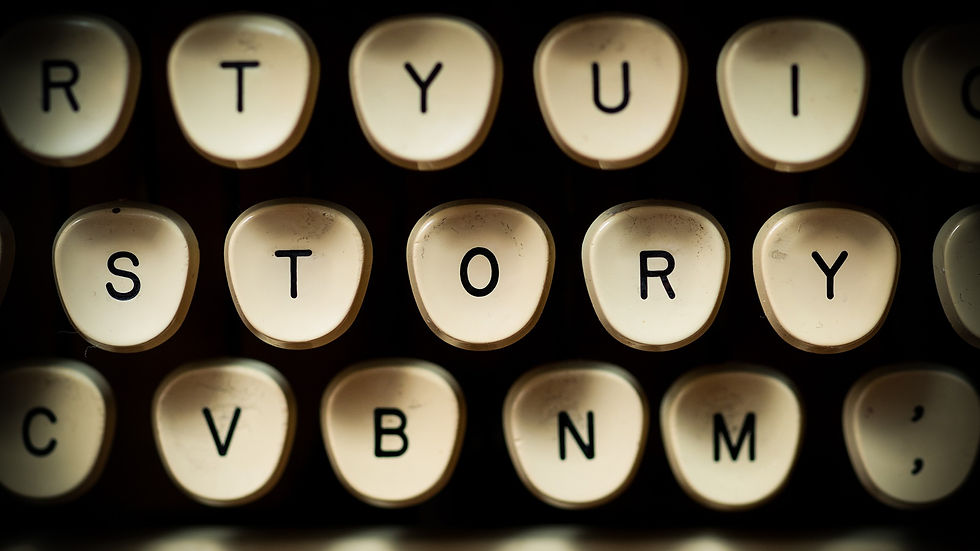How to Start Writing a Play
- Daniel Spragge

- Aug 11, 2021
- 4 min read
Updated: Aug 12, 2021
5 Methods to Begin Crafting your Story

Have you always wanted to write a play but been unsure of how to start? The launch of any writing process can seem daunting. I have often felt overwhelmed searching for a worthy idea. The good news is there are many ways to begin.
I discovered these starting places over years of dramatic writing. Some I learned from reading books or talking with other writers about their processes, some I stumbled on myself. The good news is that there is no right way to do things. I have tried each of these techniques and know they all work exceptionally well.
So what are these mysterious methods we can use to start writing a play? In my experience, there are 5:
1. Character
2. Plot
3. Theme
4. Topic
5. Concept
Check out this infographic to get a quick overview of each process.

These techniques are jumping-off points to launch you on your creative journey. I use these methods to ideate. Once you have an idea, expand, refine, and specify it until it is worthy of a feature-length narrative.
Let’s talk a little more in-depth about each method.
Character

This method is a favourite among many playwrights. My way into this method is often through freewriting. Put your imagined characters in a situation and see how they react. Freewriting will deepen your understanding of the characters and help you craft 3-dimensional people.
The risk with freewriting is that it will be messy. My rule is to write plays with an equal balance of intellect and instinct. Intellect is all the analytical work you do before writing, such as research or outlines. Freewriting heavily favours intuition, which will result in a hefty rewriting process.
A couple of great examples of writing from character are Quentin Tarantino’s Once Upon a Time... in Hollywood and Halley Feiffer’s I’m Gonna Pray for You So Hard.
Plot
This method is a favourite among screenwriters. If you want to write (in general, but especially if you're going to write from plot), I recommend reading up on 3-act and 5-act story structure.

3-act story structure is how most movies are structured: beginning, middle, and end. 5-act structure is not as popular today, but it is how Shakespeare structured his plays: exposition, rising action, climax, falling action, denouement.
Outlining your story will ensure each scene is contributing to the overall narrative. I outline nearly all my writing work, no matter which starting method I choose. Having an outline provides a robust intellectual framework for the story so that I can focus on my instincts while I am writing.
When constructing a narrative, it’s best practice for your plot points to be provoked by the actions of characters and not by 3rd parties, coincidence, or acts of god.
Theme
Prioritizing the theme is a great way to explore big questions and challenge beliefs. It is a philosophical way of working. An easy way to start working from a theme is to develop a question. For example, “what is the meaning of life?” Then you could establish characters with differing viewpoints and have them duke it out.
Character 1: Life is meaningless.
Character 2: Life is beautiful.
Their opposing philosophies will create dramatic tension but may also reveal a profound insight into the human condition.
Alternatively, you could also state your theme as a single word, then develop a narrative to unearth it.
Topic
Did you read something in the news that made your blood boil with rage? Use that topic and feeling as a starting place. My play, Clinic, began this way.
Researching a topic will uncover a plethora of potential narratives. The trick with writing from a topic is to avoid writing a lecture. No one wants to be preached at. Guarantee your story contains a multitude of viewpoints that exhibits the full complexity of the subject.
Concept

Writing from a concept is a way to discover a theme. If you are writing from a concept, you have a general idea, then develop that idea to uncover a theme. Once you have exposed the theme, your initial concept becomes a visual representation of it.
Let’s use Ionesco’s Rhinoceros as an example. He may have thought one day, “what if everyone slowly began turning into a rhinoceros?” He then uses this concept to start writing. As he begins working on the piece, it becomes evident that he is writing about conformity. So he goes back to the beginning and rewrites to ensure the theme is prevalent in every moment of the play.
Final Thoughts
I hope these methods of how to start writing a play will help you create a new piece of dramatic writing. For me, the beginning is always the most challenging part of any writing process. When writing the first draft, I try to allow myself the freedom to explore and fail without judgement. Then once the draft is complete, I ruthlessly edit.
If you need any clarification on any of these methods or think I’ve missed something, please don’t hesitate to reach out. I am always happy to chat about writing.
Comments